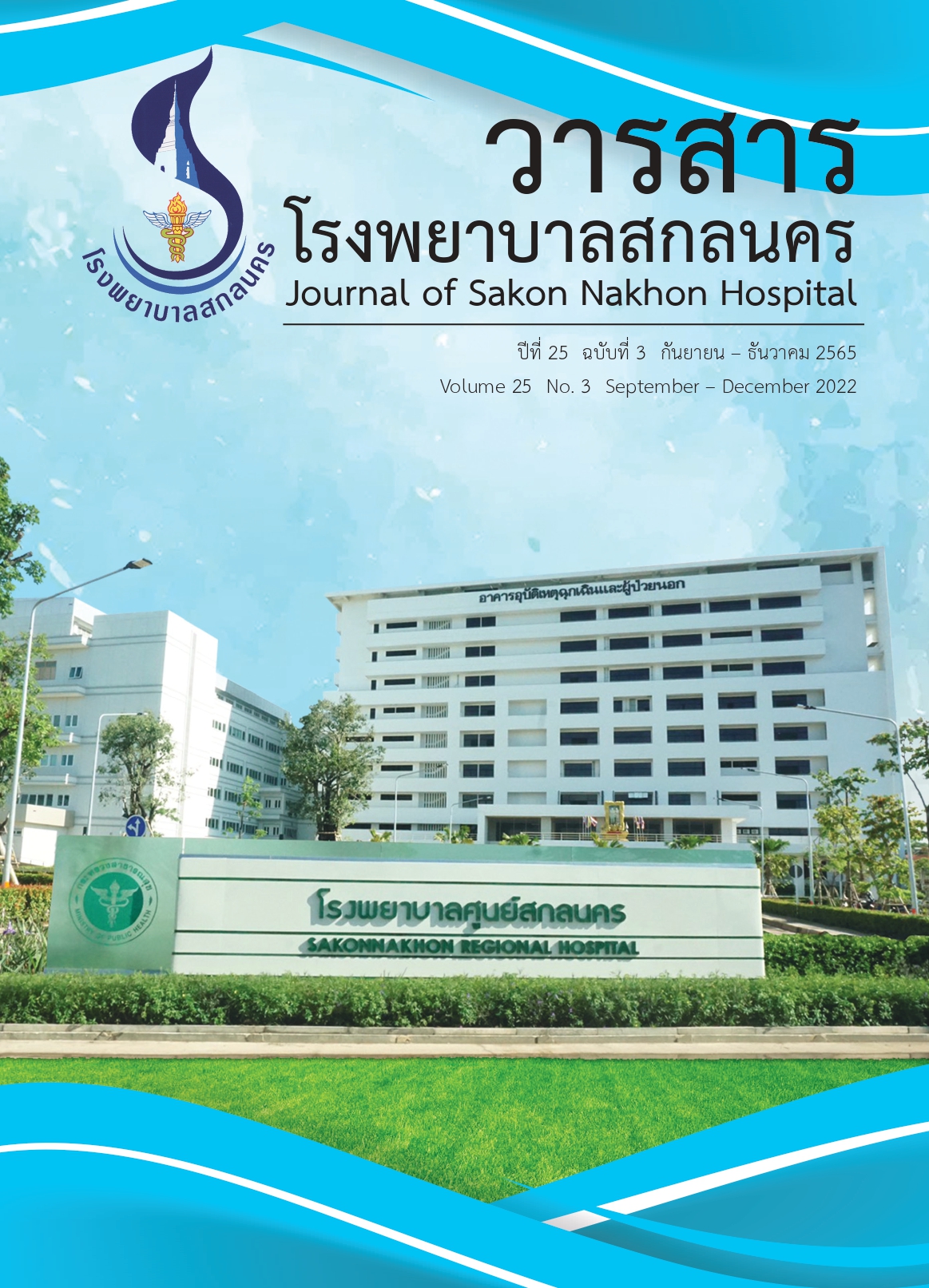Factors Affecting Exclusive Breastfeeding in Newborns: A Systematic Review
Keywords:
Exclusive Breastfeeding, Newborn, Systematic ReviewAbstract
This systematic review aimed to summarize the knowledge of the factors affecting success of exclusive breastfeeding in newborns. The review was conducted systematically to find researches reported from 2012 to 2022. The research quality was assessed using a quality assessment form developed by the Joanna Briggs Institute. The data were extracted using an extraction model developed by the Joanna Briggs Institute. There were 52 researches found to study the factors affecting success of exclusive breastfeeding in newborns. Twelve out of fifty–two researches passed the inclusion criteria for the systematic review. All were descriptive studies of the factors contributing to the success of breastfeeding in newborns. The selected studies were not comparable in terms of the similarity of the primary and dependent variables. Therefore, the content summary method describing the nature of results was applied in this systematic review.
It was found that the factors affecting success of breastfeeding in newborns included: 1) maternal and infant factors comprising age, education, occupation, nipple characteristics, knowledge of breastfeeding, breastfeeding attitude, perceived self–efficacy in breastfeeding, more than 90 days of absence from work to support a child after giving birth or not working, having experience with breastfeeding and accessibility to services, 2) social and family support factors and 3) nurse support factor.The recommendation from the results of this review is that the modifiable factors could be developed into a breastfeeding promotion program.
References
กรมอนามัย กระทรวงสาธารณสุข. การปกป้องส่งเสริม และสนับสนุนการเลี้ยงลูกด้วยนมแม่[อินเทอร์เน็ต]. 2564 [เข้าถึงเมื่อ 1 พฤศจิกายน 2565]. เข้าถึงได้จาก: https://hp.anamai.moph.go.th/web–upload/4xceb3b571ddb70741ad132d75876bc41d/tinymce/OPDC/OPDC2565–F/IDC1_7/opdc_2565_
IDC1–17_18.pdf
Walters D, Horton S, Siregar AYM, Pitriyan P, Hajeebhoy N, Mathisen R, et al. The cost of not breastfeeding in Southeast Asia. Health Pol Plann 2016;31(8):1107–16.
World Health Organization (WHO)/United Nations Children’s Fund(UNICEF). Baby–friendly hospital initiative revised updated and expanded for integrated care [Internet].2009[Cited 2022 Nov 05]. Available from: https://apps.who.int/iris/handle/10665/43593
UNICEF. Babies and mothers worldwide failed by lack of investment in breastfeeding [Internet].2017[Cited2022 Nov05]. Available from: https://www.unicef.org/media/media_98546.html
ปัณณทัต บนขุนทด, วิภาดา กาญจนสิทธิ์, ชนาธิป สันติวงศ์, สุพรรษา จิตรสม, พิมพ์รดา ธรรมีภักดี, ศุกลรัตน์ชาญวิรัตน์, และคนอื่นๆ. ความรู้และทัศนคติของมารดาหลังคลอดปกติที่ต้องการเลี้ยงบุตรด้วยนมมารดาอย่างเดียวนาน 6 เดือน. ว. การแพทย์โรงพยาบาลอุดรธานี2563;28(3):275–283.
สำนักงานสถิติแห่งชาติประเทศไทย. โครงการสำรวจสถานการณ์เด็กและสตรีในประเทศไทย พ.ศ. 2562 รายงานผลฉบับสมบูรณ์. กรุงเทพฯ: สำนักงานสถิติแห่งชาติประเทศไทย; 2563.
Aromataris E, Munn Z. JBI Manual for Evidence Synthesis [Internet]. 2020 [Cited 2022 Nov 05] Available from: https://synthesismanual.jbi.global
Stetler CB, Morsi D, RuckiS, Broughton S, Corrigan B, FitzgeraldJ,etal. Utilization focused integrative reviews in a nursing service. Appl Nurs Res 1998;11(4):195–206.
ณัฏพรรณ โภคบุตร. การศึกษาปัจจัยที่มีความสัมพันธ์กับพฤติกรรมการเลี้ยงลูกด้วยนมแม่และพฤติกรรมการให้อาหารเสริมทดแทนนมแม่ [วิทยานิพนธ์]. กรุงเทพฯ: มหาวิทยาลัยมหิดล; 2559.
ทัศนีย์รวีภควัต. ปัจจัยที่มีผลต่อความสำเร็จในการเลี้ยงลูกด้วยนมแม่อย่างเดียว 6 เดือน ของมารดาที่มารับบริการในคลินิกนมแม่ ศูนย์อนามัยที่13 กรุงเทพฯ. ว. กรมการแพทย์ 2560;42(5):42–48.
ภัทรพร ชูประพันธ์, วีณา เที่ยงธรรม และปาหนัน พิชยภิญโญ. ปัจจัยที่มีอิทธิพลต่อการเลี้ยงลูกด้วยนมแม่อย่างเดียว 6 เดือน ของแม่ในเขตภาคกลางตอนล่าง. GRC [อินเทอร์เน็ต]. 2557 [เข้าถึงเมื่อ 5 พฤศจิกายน 2565]; MMP73:1723–1732. เข้าถึงได้จาก: https://gsbooks.gs.kku.ac.th/57/grc15/files/mmp73.pdf
พนิดาสุขพิทักษ์,วันธณีวิรุฬห์พานิช. ปัจจัยคัดสรรทำนายการเลี้ยงลูกด้วยนมแม่อย่างเดียว 6 เดือนของมารดาที่มีบุตรเกิดก่อนกำหนด. ว. มหาวิทยาลัยนราธิวาสราชนครินทร์2565;14(2):247–263.
อิงหทัย ดำจุติ, ศศิกานต์กาละ. ปัจจัยที่มีอิทธิพลต่อความสำเร็จในการเลี้ยงลูกด้วยนมแม่อย่างเดียว 6 เดือน ของมารดาทำงานนอกบ้าน. ว. เครือข่ายวิทยาลัยพยาบาลและการสาธารณสุขภาคใต้ 2565;9(1):107–120.
นิตยา สินสุกใส, ศศิธารา น่วมภา และพฤหัส จันทร์ประภาพ. ปัจจัยทำนายการเลี้ยงลูกด้วยนมแม่อย่างเดียว 6 เดือน ในมารดาผ่าตัดคลอด. J Nursing Science 2560;35(1):14–21.
ชิดชนก พันธ์ป้อม, วรรณา พาหุวัฒนกร และปิยะนันท์ลิมเรืองรอง. ปัจจัยที่มีอิทธิพลต่อการเลี้ยงลูกด้วยนมแม่อย่างเดียว 6 เดือนในมารดาที่ทำงานนอกบ้าน. NURS SCI J THAIL 2563;38(1):47–59
มัทนา สังวาลย์และ กาญจนา นะรมรัมย์. ปัจจัยที่มีอิทธิพลต่อระยะเวลาการให้นมแม่ของบุคลากรโรงพยาบาลรามาธิบดี. Rama Med J 2563;43(3)2563:1–12.
สมพงษ์ ชัยโอภานนท์. ปัจจัยที่มีผลต่อการเลี้ยงลูกด้วยนมแม่อย่างเดียว 6 เดือนในจังหวัดนนทบุรี.ว. สมาคมเวชศาสตร์ป้องกันแห่งประเทศไทย 2559;6(2):97–108.
ธิดารัตน์หวังสวัสดิ์, นันทา กาเลี่ยง, อนงค์ภิบาล, รัตนา ใจสมคม และ วนิสา หะยีเซะ. ปัจจัยที่มีอิทธิพลต่อความตั้งใจในการเลี้ยงลูก ด้วยนมแม่อย่างเดียวนาน 6 เดือน ของมารดาในจังหวัดนราธิวาส. พยาบาลสาร 2557;41(พิเศษ):123–133.
พัฒนา ฤกษ์ดำเนินกิจ. ปัจจัยที่มีผลต่อความสำเร็จในการเลี้ยงลูกด้วยนมแม่อย่างเดียว 6 เดือนในแม่ทำงานนอกบ้าน ในคลินิกนมแม่ ศูนย์อนามัยที่1เชียงใหม่. ว. การส่งเสริมสุขภาพและอนามัยสิ่งแวดล้อมล้านนา 2561;8(2):34–41.
สุภางค์พิมพ์รัตตสัมพันธ์และ เบญจวรรณ แก้วมา. ปัจจัยทำนายความสำเร็จในการเลี้ยงลูกด้วยนมแม่อย่างเดียวในมารดาที่ทำงานนอกบ้าน. ว. พยาบาลสงขลานครินทร์2561;38(4):14–24.
Green LW, Kreuter MW. Health Program Planning An Educational and Ecological Approach. 4th ed. New York: McGraw–Hill; 2005.
Aikawa T, Pavadhgul P, Chongsuwat R, Sawasdivorn S, Boonshuyar C. Maternal return to paid work and breastfeeding practices in Bangkok, Thailand. Asia Pac J Public Health. 2015;27(2):1253–62.
ลักขณา ไชยนอก. ปัจจัยที่มีอิทธิพลต่อพฤติกรรมการเลี้ยงลูกด้วยนมแม่ของมารดาวัยรุ่นหลังคลอดในโรงพยาบาลมหาราชนครราชสีมา [รายงานวิจัย]. นครราชสีมา: สำนักวิชาพยาบาลศาสตร์มหาวิทยาลัยเทคโนโลยีสุรนารี; 2558.
Nguyen NT, Prasopkittikun T, Payakkaraung S, Vongsirimas N. Factors predicting six month exclusive breastfeeding among mothers in Ho Chi Minh City. Vietnam J. Health Research 2022;3(2):219–30.
Tangsuksan P, Ratinthorn A,SindhuS,Spatz DL, Viwatwongkasem C. Factors Influencing Exclusive Breastfeeding among Urban Employed Mothers: A Case–Control Study. Pacific Rim International Nursing Journal 2020;24(1):54–72.
Downloads
Published
How to Cite
Issue
Section
License
บทความที่ตีพิมพ์ถือว่าเป็นลิขสิทธิ์ของวารสารโรงพยาบาลสกลนคร การคัดลอกเพื่อพัฒนาเชิงวิชาการต้องได้รับการอ้างอิงอย่างถูกต้อง






